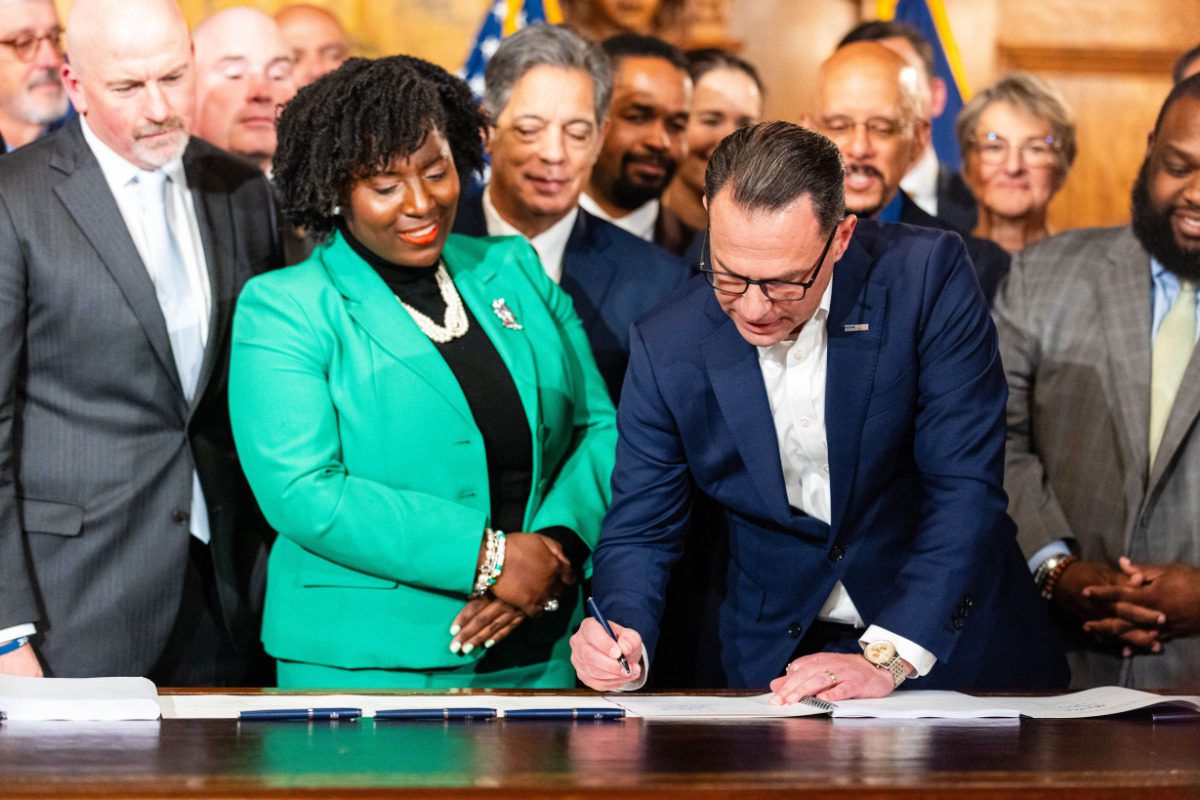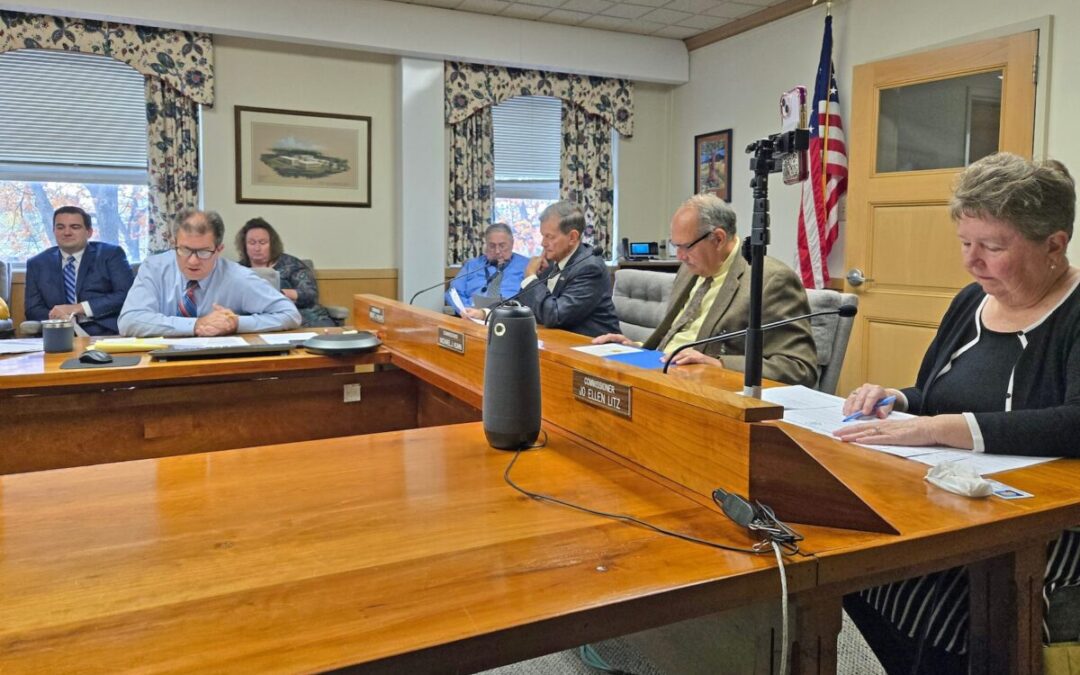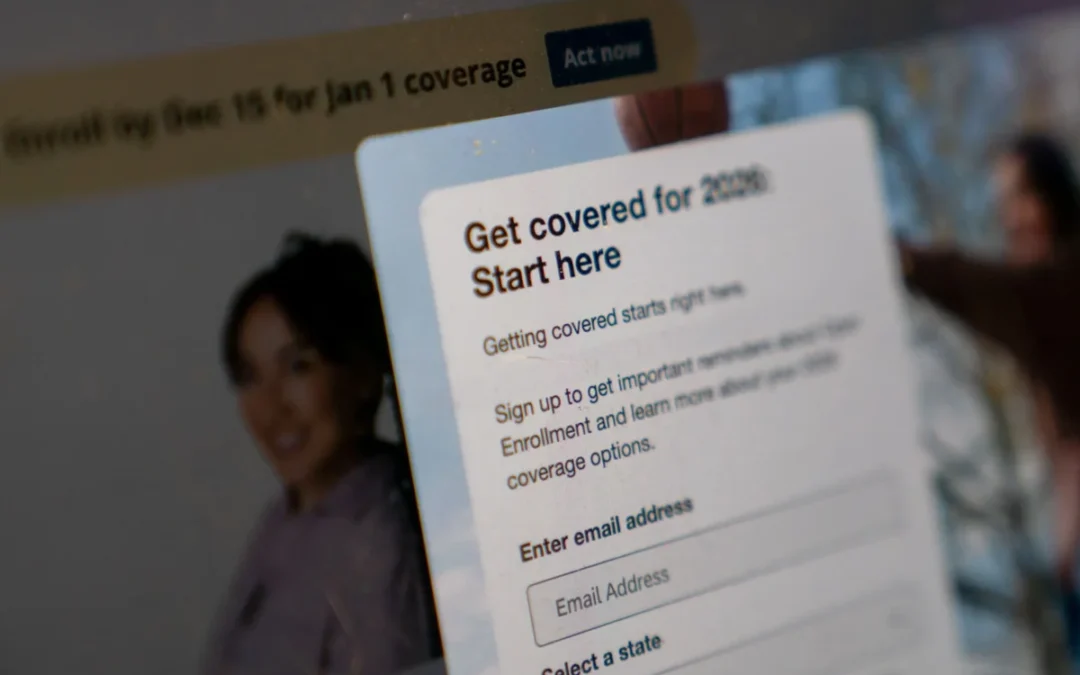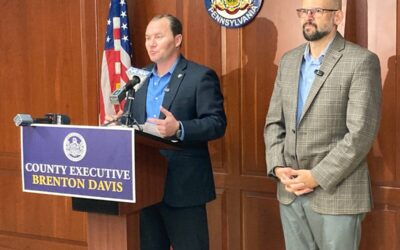
Gov. Josh Shapiro signing the 2025-2026 Pennsylvania budget inside the governor's reception room at the Pennsylvania State Capitol in Harrisburg on Nov. 12, 2025. (Photo: Sean Kitchen)
The last state in the nation without some form of a budget for the 2025-26 fiscal year finally has a spending plan in place.
Gov. Josh Shapiro signed a $50.1 billion state budget Wednesday after intensive meetings between Republican and Democratic lawmakers in recent weeks. They had been deadlocked for nearly five months since the June 30 deadline.
The budget, Shapiro’s third, increases overall spending by 4.7% compared to the previous year but represents a $1.4 billion reduction from his proposal in February.
Before signing the bills that make up the spending plan, Shapiro noted leaders from the House and Senate had worked through the summer and fall and rejected calls by some Republicans to slash healthcare spending and other critical programs.
“We stayed at the table. We refused to accept inaction,” Shapiro said. “Because my top priority has been delivering a budget that makes a meaningful impact on the good people of Pennsylvania.”
Shapiro stressed that the spending plan is balanced, reduces taxes and preserves the state’s roughly $7 billion rainy day fund.
It continues a phased reduction in the state’s corporate net income tax to 7.49% and provides a state earned income tax credit for low- and moderate-income families that will provide $193 million in tax relief. It also projects that the state will end this fiscal year with $8 billion in its rainy day fund.
In a major concession for some Democrats, Republican lawmakers won a long-sought policy goal by getting Shapiro to withdraw from a regional greenhouse gas reduction program they likened to a tax on energy and a drag on economic growth in the commonwealth. And it includes reforms to environmental permitting that advocates say make Pennsylvania more business friendly.
“This budget took much longer than expected but ultimately Senate Republicans held the line to keep our promise to the people of Pennsylvania by not raising taxes and ensuring our state savings account – the rainy day fund – was not attacked,” Senate President Pro Tempore Kim Ward said. “It is important for Pennsylvanians to know this budget is the direct result of a divided government and two very different approaches to how we govern our state and partner with the federal government.”
Ward added Senate Republicans compromised by agreeing to spend more than the $47.6 billion they proposed in August.
House Appropriations Committee Chairperson Jordan Harris (D-Philadelphia) said before the vote that although the budget was late, it reflects the shared interests of rural, urban and suburban Pennsylvanians.
“This budget represents us coming together to recognize that while everyone may not have gotten everything, that we can work together collectively … to have a document that we can be proud of that delivers on the promises that many of us have made to the people,” Harris said.
It passed the House with a 156-47 vote and a 40-9 tally in the Senate.
“This budget builds on the progress we’ve made to be able to deliver better schools and more opportunity for our kids, because I believe every single child deserves the freedom to chart their own course and the opportunity to succeed,” Shapiro said.
It continues an increase in funding to put the commonwealth’s most underfunded schools on an equal footing while enacting reforms to control what taxpayers must spend for privately run cyber charter schools. The state’s 500 school districts will receive $785 million or 7.5% more compared to the 2024-2025 budget.
That includes an additional $565 million in adequacy funding to address a state court’s finding that the reliance on property taxes to fund education put students in less wealthy communities at a disadvantage. The program will be expanded to ensure every district receives at least $50,000, although a majority will receive more to make up for decades of funding disparity.
“This budget shows bipartisan consensus that the march to constitutional school funding is not optional. It took too long, but we moved one year closer to a system that will transform lives,” Dan Urevick-Ackelsberg, senior attorney with the Public Interest Law Center that helped win the lawsuit over education funding, said.
School districts will also be permitted to deduct more from the per-pupil tuition they’re required to pay for students who attend online charter schools. It’s estimated the changes will reduce the cost by an estimated $178 million statewide.
Other cyber charter school reforms include a requirement for teachers to see and communicate with students at least once a week to help ensure student welfare in the wake of several child abuse cases that went unnoticed because the children weren’t attending school in person.
Susan Spicka, executive director of Education Voters PA, said the reforms are a “significant step toward reining in wasteful spending by the cyber charter industry and creating accountability for cyber operators to ensure that their students are supported, safe, and actually attending school.”
Republican leaders said Wednesday after the budget bills passed that enacting policies to foster economic and job growth, such as the withdrawal from the Regional Greenhouse Gas Initiative (RGGI), are essential to the sustainability of state government.
“We would be in a situation in a couple years where we simply would not have the money to fund any budget that is anywhere close to what we have now, let alone increases in the future,” House Minority Leader Jesse Topper (R-Bedford) said in a news conference.
RGGI aims to reduce climate-warming carbon dioxide emissions from power plants by requiring the companies that own them to invest in clean energy projects. The multi-state program has been in place in about a dozen mid-Atlantic and northeastern states for more than a decade.
But Topper and other Republicans have said the program, which former Democratic Gov. Tom Wolf entered by executive order in 2019, restrained the state’s ability to make use of its vast natural gas resources. Pennsylvania’s participation in the program has been on hold as state courts sorted out challenges questioning whether it is constitutional.
Environmentalists spoke out against abandoning RGGI last week as it became clear the program was a bargaining chip in ongoing negotiations. Amanda Leland, managing director at EDF Action, said Wednesday the compromise needlessly abandoned a promising tool for lowering energy costs and cutting pollution.
“Pennsylvanians are calling for cleaner air, lower energy bills and a responsible state budget — not for their governor to lock the state into dirty, expensive energy sources of the past,” Leland said.
Shapiro said he still plans to pursue an alternative plan that keeps energy investments by carbon emitters in the commonwealth and positions the state as an energy exporter. But Topper told the Capital-Star that no programs similar to RGGI would get consideration in the General Assembly.
“We’re trying to address costs,” he said. “I do not believe that natural gas development is a threat to the environment. So, no, I don’t think anything needs to happen to replace it,” Topper said.
Senate Majority Leader Joe Pittman (R-Indiana) said the permitting reforms that are included in the budget package are also essential to Pennsylvania improving its competitiveness. They would streamline the Department of Environmental Protection’s review process for air and water quality impacts and require the agency to meet deadlines or permits would be automatically approved.
Pittman pointed to an announcement Wednesday by Pittsburgh-based U.S. Steel that it plans to build a new plant in Arkansas.
“The governor of Arkansas made the comment at the time that we put shovels in the ground faster than Pennsylvania issues permits,” Pittman said. “That type of bureaucracy is not acceptable. And so what we have done here has completely changed the paradigm.”
Capital-Star reporter Ian Karbal contributed to this story.

God’s Meal Barrel has been putting food on the table to feed Hanover families since 1986
On Monday morning, Nov. 3, as uncertainty lingered over the future of Supplemental Nutrition Assistance Program (SNAP) payments to the more than 22...

Stars of ‘Friends,’ ‘Stranger Things’ working on movie about Erie pizza bomber case
Erie's infamous pizza bomber case is the subject of a film being directed by a former "Friends" and "Scream" star. Courteney Cox is helming the true...

Lebanon officials say PA state budget impasse will cost county in 2026
As the Pennsylvania 2025-26 budget impasse continues, Lebanon County officials say the delay could result in major impacts for residents for 2026....

Expiration of ACA tax credits to hit small businesses across Pennsylvania
Many small business owners support permanently extending the ACA tax credits, according to a new report. As Pennsylvanians face increased health...

Why health insurance is so expensive this year — and what you can do about it.
Michelle Andrews November 4, 2025 This year’s Obamacare open enrollment period, which started Nov. 1 in most states, is full of uncertainty and...




